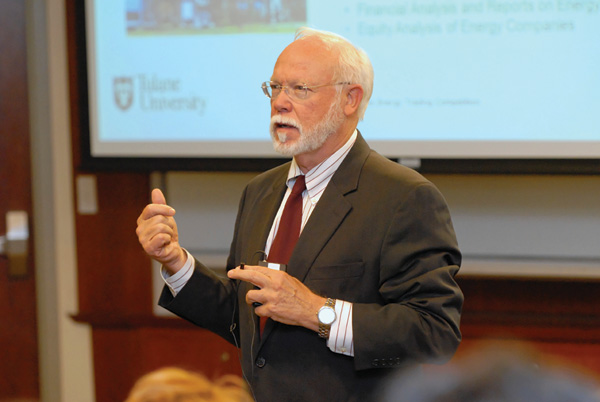
As part of the program’s annual energy “boot camp,” Master of Management in Energy students tour Entergy’s Ninemile Point power plant in Westwego, La.
The Master of Management in Energy (MME) program marked its fifth birthday in July, and according to James McFarland, it was a milestone worth celebrating.
“The program has exceeded our expectations,” says McFarland, Lawrence Distinguished Chair in Finance and executive director of the Tulane Energy Institute, who oversees the program. “The students are very happy with the program, the job market’s been good, and we have loyal recruiters, corporate sponsors and advisory board members who love what we’re doing.”
The 10-month, 36-credit-hour program is targeted at recent college graduates who wish to take on managerial roles in energy, trading, finance and consulting organizations. The curriculum includes energy-focused courses in accounting, data analysis, economics, investment banking, modeling, portfolio management, risk management, strategy and trading. Through partnerships with vendors including Thomson Reuters, Trading Technologies, Morningstar, 1Derrick, MathWorks and TradeStation, students gain hands-on experience with leading commercial software products. The program also has close ties to employers, including Accenture, Capital One, Citibank, Entergy, Koch Industries, Phillips 66, Trafigura and others, ensuring that the curriculum matches the needs of the industry.

James McFarland, executive director of the Tulane Energy Institute, says talks are underway to expand the Master of Management in Energy program to the Freeman School’s Houston campus.
“There’s still no program quite like this one,” says McFarland. “No other program has the level of intensity in terms of industry knowledge that we try to have the students learn.”
The program has thus far been limited to New Orleans, but McFarland says talks are underway to expand the program to Houston, possibly as a joint-degree offering with the Freeman School’s Houston Master of Finance or Professional MBA program.
“It’s a different target market there,” McFarland says. “There are probably more people with work experience, and it will be a slightly older population, so we’ll have to look at the curriculum and see what works.”
The program has improved consistently over its five-year history, and McFarland says it has added more than 15 new courses since its debut, growth that benefits all the Freeman School’s programs.
“When we build new areas, we’re always looking to enhance the value of our other programs, and that’s what we’ve done here,” McFarland says. “We now have more than 150 students getting energy specializations every year, and those students have additional electives to choose from because of the Master of Management in Energy.”

